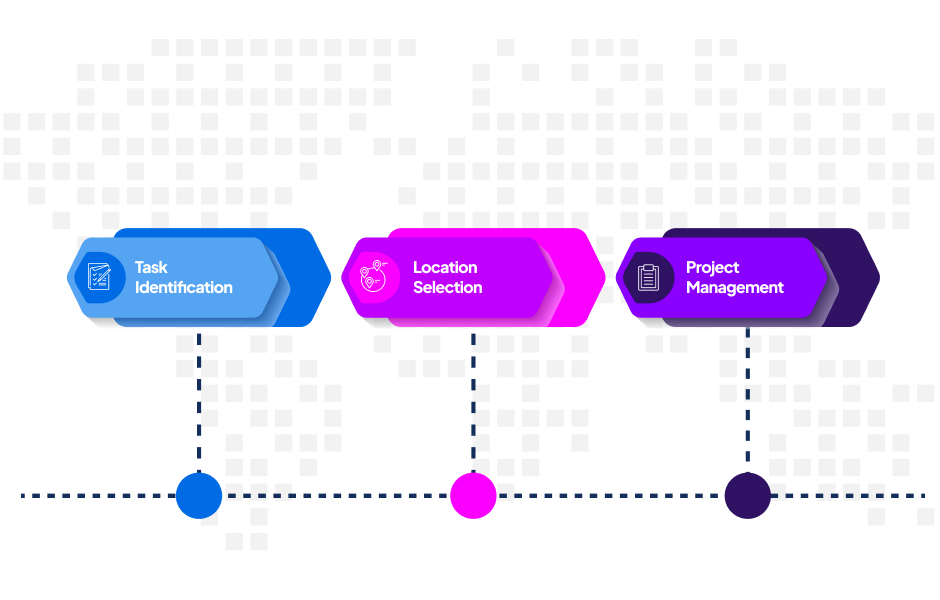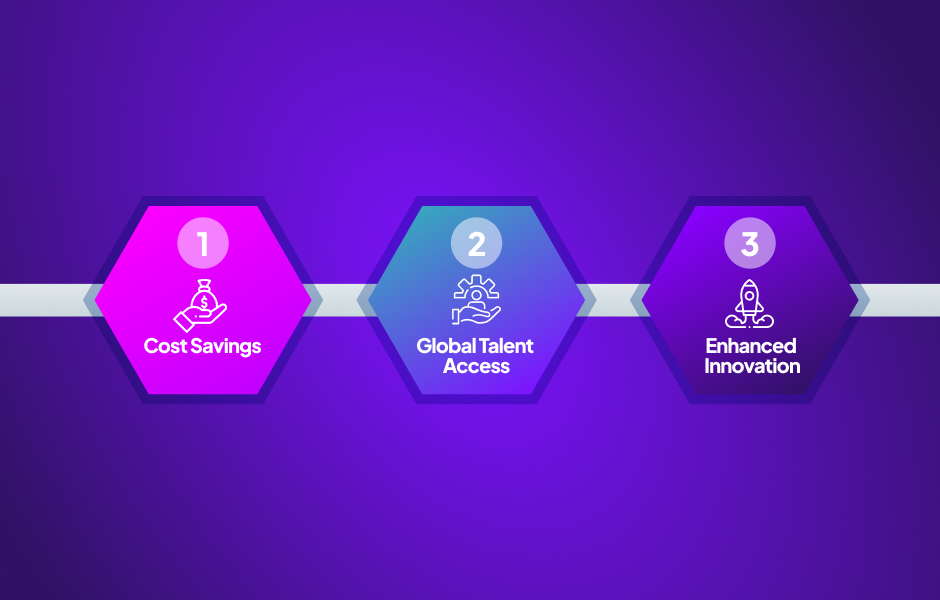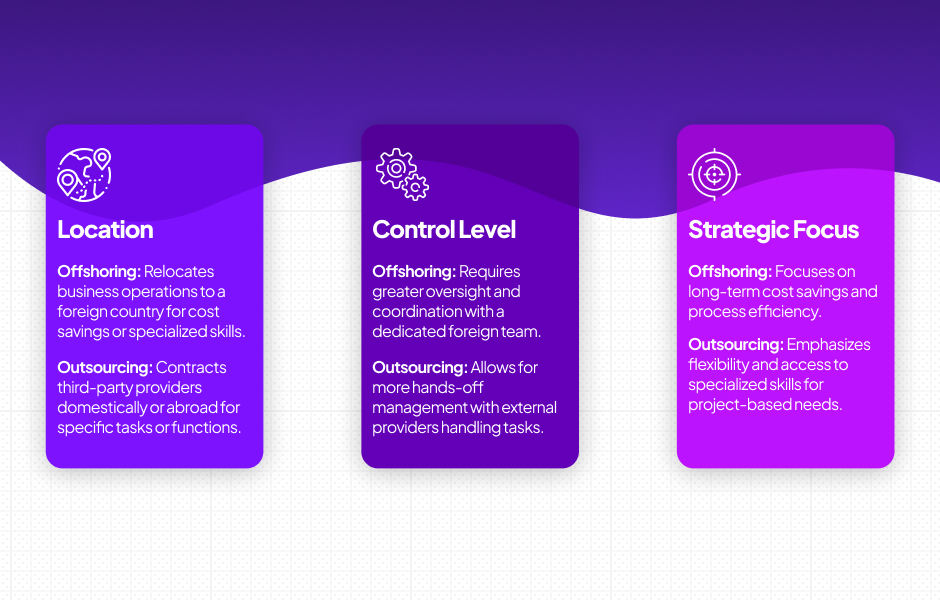Welcome to our guide on offshoring! As a business leader, you always seek ways to grow, boost efficiency and stay competitive. At Cambria, with 40 years in the industry, we know offshoring is a strong strategy to achieve these goals, especially for companies looking tocut development costs by 60-80%. In this article, we'll explore what offshoring is, how it benefits your company and key considerations for a successful offshoring plan. Let's jump in and see how offshoring can elevate your business!
Understanding Offshoring
At its core, offshoring means moving certain business functions or processes to another country, usually to leverage lower labor costs, access specialized skills or other economic benefits. By shifting these tasks overseas, companies cut expenses, improve efficiency and focus on their core competencies.As an experienced offshoring companywith a global presence reflecting our commitment to making the world more connected through accessible software development, Cambria has guided many clients through this process and helped them reap the rewards of a global workforce.
Definition and Overview
Offshoring is outsourcing business operations to a foreign country. When a company offshores, it establishes a presence in the chosen location, either by setting up its own facilities or partnering with local providers like Cambria. This allows the company to tap into the country's resources, infrastructure and talent pool to support its business needs. Offshoring can include a wide range of functions, from manufacturing and software development to customer support and back-office tasks.
History of Offshoring
The concept of offshoring has existed for decades, but it gained significant momentum in the late 20th century. As globalization advanced and technology progressed, companies began to see the potential benefits of moving operations overseas. Initially, offshoring centered on manufacturing, with businesses relocating production to countries with lower labor costs. As the IT industry expanded, software development and support services became popular offshoring targets.Cambria, a family-owned custom programming company, embraced this trend in 2006 by expanding to the Philippines, becoming an international software development outsourcing company. Today, offshoring has evolved to encompass a wide spectrum of industries and functions, with companies continuously exploring new opportunities to optimize their operations and gain a competitive advantage.

The Offshoring Process
Implementing a successful offshoring strategy requires careful planning and execution. As a decision maker, you'll need to navigate a series of steps to ensure a smooth transition and maximize the benefits of offshoring for your company. From identifying the right tasks to offshore and establishing clear objectives, to selecting the optimal location and managing the ongoing relationship, each phase plays a crucial role in achieving your goals. Over the years,Cambria has proven itself as a flexible and effective provider of various programming services, thriving in the fast-paced, ever-changing tech landscape of Silicon Valley, particularly during the dot-com boom.
Selecting an Offshore Location
Choosing the right offshore location is a critical decision that can significantly impact the success of your offshoring initiative. When evaluating potential destinations, consider several factors. Cost is often a primary driver, as offshoring to countries with lower labor costs can lead to substantial savings. However, it's crucial to balance cost savings with other important criteria, such as the availability of skilled talent, language proficiency, cultural compatibility, political stability and infrastructure.The Philippines, an archipelago of more than 7,000 islands, has emerged as a leading offshoring destination due to its large pool of English-proficient professionals, strong cultural alignment with Western countries and supportive business environment.Cambria's decision to expand to the Philippines in 2006 was deliberate, seeing the country as a goldmine of untapped talent aligned with our standards of quality, communication and dedication to providing accessible and affordable custom programming services.
Benefits of Offshoring
Offshoring offers a wide range of benefits for companies looking to optimize their operations, reduce costs and gain a competitive advantage. By leveraging the strengths of offshore locations, businesses can access a global talent pool, enhance their capabilities and drive innovation. Let's explore some of the key advantages that make offshoring an attractive strategy for growth-oriented organizations.

Cost savings is one of the most compelling reasons to consider offshoring. By relocating certain functions to countries with lower labor and overhead costs, companies can significantly reduce their expenses without sacrificing quality. These savings can be reinvested in other areas of the business, such as research and development, marketing or expansion into new markets. Additionally, offshoring allows companies to tap into a vast pool of skilled professionals from around the world. The Philippines, known for its strong English proficiency and cultural compatibility,ranks 1st on the Business English Index with a score of 7.95, highlighting its competitive edge in communication skills for the IT-BPM sector. At Cambria, we have witnessed firsthand how access to global talent can bring fresh perspectives, specialized expertise and diverse experiences to our clients' organizations, fostering innovation and creativity. Our web design team alone hascrafted over a thousand websites, while on the software side, we've successfully completed more than 2,565 projects, each one tailored to our clients' specific needs.
Challenges in Offshoring
While offshoring presents numerous opportunities, it's important to be aware of the potential challenges and risks involved. As a business leader, you'll need to proactively address these issues to ensure a successful offshoring experience. By understanding the common pitfalls and implementing effective strategies to mitigate them, you can minimize disruptions and maximize the value of your offshoring initiatives.
Communication and Cultural Differences
One of the most significant challenges in offshoring is navigating communication and cultural differences. When working with teams in different countries, language barriers, time zone variations and cultural nuances can lead to misunderstandings and miscommunications. To overcome these obstacles, it's essential to invest in robust communication channels, such as video conferencing and collaboration tools, and establish clear protocols for regular check-ins and updates.
At Cambria, we provide cross-cultural training for both onshore and offshore teams to help bridge the gap and foster a shared understanding of expectations and work styles, leveraging our experience in transforming into an international software development outsourcing company.
Quality Control and Security Concerns
Maintaining consistent quality standards and protecting sensitive data are critical considerations in offshoring. With teams working remotely, it can be more challenging to monitor performance and ensure adherence to quality metrics. To address this, companies must establish clear quality control processes, including regular audits, performance reviews and feedback mechanisms.
Our track record of completed projects showcases our commitment to quality and security. Implementing strict security measures, such as data encryption, access controls and employee training, is also crucial to safeguard confidential information and maintain the trust of your customers and stakeholders.
Offshoring vs. Outsourcing
While offshoring and outsourcing are often used interchangeably, there are distinct differences between the two strategies. Understanding these nuances is essential for making informed decisions about which approach best aligns with your company's goals and requirements. Let's explore the key differences and similarities between offshoring and outsourcing and discuss the factors to consider when choosing between the two.
Key Differences and Considerations
Outsourcing involves contracting a third-party provider to handle specific tasks or functions, which can be located either domestically or abroad. In contrast, offshoring specifically refers to relocating business operations to a foreign country, often to leverage cost advantages or access specialized skills. While both strategies can offer benefits such as cost savings and increased flexibility, the level of control and involvement in the day-to-day operations may differ. Outsourcing often allows for more hands-off management, while offshoring may require a greater degree of oversight and coordination.

When deciding between offshoring and outsourcing, it's important to consider factors such as the nature of the tasks, the level of expertise required and the long-term strategic goals of your company. Some functions may be better suited for outsourcing, particularly if they are project-based or require highly specialized skills. On the other hand, offshoring can be a more effective solution for ongoing, process-oriented tasks that benefit from cost savings and a dedicated team.According to a recent survey, India, Poland and Mexico are the top three locations for the largest shared services centers, highlighting the global nature of offshoring and outsourcing decisions. At Cambria, we work closely with our clients to carefully evaluate their unique needs and priorities, helping them determine which approach will deliver the greatest value for their organization,leveraging our experience offering everything from custom software development to full-service website design and even hardware support.
Future Trends in Offshoring
As technology advances and global markets evolve, the landscape of offshoring is also undergoing significant changes. From the growing influence of automation and artificial intelligence to the shift towards remote work accelerated by the COVID-19 pandemic, businesses must stay attuned to emerging trends and adapt their offshoring strategies accordingly. By embracing innovation and remaining agile, companies can position themselves to capitalize on new opportunities and maintain a competitive edge in an increasingly complex and dynamic business environment.
The Role of Technology in Offshoring
Technology plays an increasingly important role in shaping the future of offshoring. Advancements in automation, artificial intelligence and machine learning enable companies to streamline processes, improve efficiency and reduce costs. Cloud computing and collaboration tools make it easier for teams to work together seamlessly across borders and time zones.By 2025, 60% of finance and accounting outsourcing contracts will not be renewed due to outdated pricing models that do not drive digitization and process improvement, emphasizing the importance of staying ahead of technological trends.
At Cambria, we continuously monitor and adapt to these evolving technologies, helping our clients leverage their full potential by rethinking the types of tasks that can be offshored, investing in digital infrastructure and training and exploring new models of collaboration and partnership, having grown with the times and added a large array of technology stacks and programming languages to our offerings over the years.
Offshoring in a Post-Pandemic World
The COVID-19 pandemic has profoundly impacted the way companies operate, accelerating the adoption of remote work and challenging traditional notions of offshoring. With distributed teams becoming the norm, businesses are reassessing their offshoring strategies to ensure they can thrive in this new reality. This may involve greater emphasis on digital collaboration, cybersecurity and business continuity planning. It also presents opportunities to tap into a wider pool of global talent and explore new offshore locations that may have been previously overlooked. As the world navigates the post-pandemic landscape, companies that can adapt their offshoring approaches to meet the evolving needs of their employees, customers and stakeholders will be best positioned for success.

Conclusions
Offshoring is a powerful strategy that can help companies drive growth, maximize efficiency and gain a competitive advantage in today's global marketplace. By understanding the benefits, challenges and best practices of offshoring, business leaders can make informed decisions and develop effective strategies for success. Whether you're considering offshoring for the first time or looking to optimize your existing approach, this comprehensive guide provides the insights and tools you need to navigate the complex world of offshoring with confidence.
This article is part of the Outsourcing series. Read more on how we craft tailored Outsourcing solutions - driving efficient growth, hassle-free:
- What are the Benefits of Outsourcing?
- What Types of Jobs are Commonly Outsourced?
- What Risks are Involved with Outsourcing?
- What Functions are Best Suited for Business Process Outsourcing?
- How does Outsourcing Create Strategic Value for Companies?
- What are the Key Factors in Making an Outsourcing Decision?
- What are the Disadvantages and Hidden Costs of Outsourcing?
- How to Build an Effective Outsourcing Strategy?
- What Factors should Determine which Functions to Outsource?
- BSO-00
- What Countries are Popular Offshore Outsourcing Destinations?
- Is Offshoring Cheaper than Outsourcing Locally?
Frequently Ask Questions (FAQ)
What types of tasks are best suited for offshoring?
Tasks that are well-defined, repetitive and do not require frequent face-to-face interaction are often good candidates for offshoring. Examples include software development, data entry, customer support and back-office functions such as accounting and human resources.
How can I ensure the security of my company's data when offshoring?
To protect your company's data when offshoring, it's essential to work with reputable service providers like Cambria that have robust security measures in place. This includes secure data centers, encryption, access controls and regular security audits. Additionally, clearly define data ownership and confidentiality agreements in your contracts and provide regular security training for your offshore teams.
What are the most popular countries for offshoring?
Some of themost popular destinations for offshoring include India, the Philippines, China and Eastern European countries such as Ukraine and Poland. These countries offer a combination of cost savings, skilled talent pools and supportive business environments. However, the best location for your company will depend on your specific needs and priorities.
How can I measure the success of my company's offshoring initiatives?
To gauge the success of your offshoring efforts, establish clear performance metrics and key performance indicators (KPIs) that align with your business goals. These may include cost savings, productivity, quality and customer satisfaction. Regularly monitor and evaluate your offshore team's performance against these metrics and use the insights to continuously improve your offshoring strategy.
What are the long-term benefits of offshoring for my company?
In addition to immediate cost savings and access to global talent, offshoring can provide long-term benefits such as increased scalability, improved focus on core competencies and enhanced competitiveness in the global market. By strategically leveraging offshoring, your company can free up resources to invest in innovation, growth and customer value, positioning itself for sustainable success in an ever-changing business landscape.
Partner with Cambria for Your Offshoring Needs
As the world of offshoring continues to evolve,Cambria, with its 40 years of expertise, stands ready to guide you through the complexities of software development outsourcing. We offer tailored solutions that include end-to-end project management, custom software development and software staff augmentation to enhance your team's capabilities. If you're a decision-maker of a company looking to drive growth, maximize efficiency and stay at the forefront of innovation, let us help you save 60-80% on development costs.Request a Free Quotetoday to hire a team of expert software developers dedicated to your project's success.






